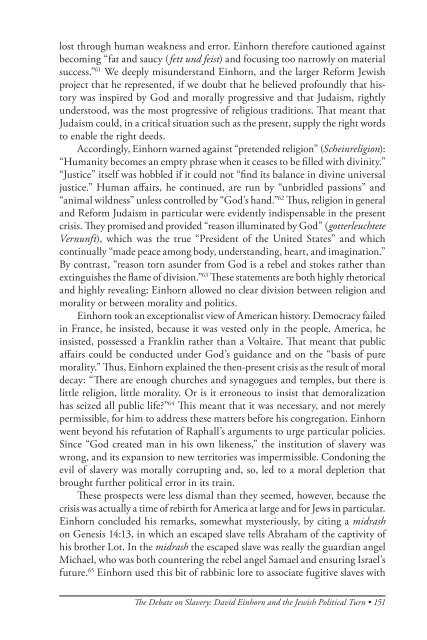American Jewish Archives Journal, Volume 64, Numbers 1 & 2
American Jewish Archives Journal, Volume 64, Numbers 1 & 2
American Jewish Archives Journal, Volume 64, Numbers 1 & 2
You also want an ePaper? Increase the reach of your titles
YUMPU automatically turns print PDFs into web optimized ePapers that Google loves.
lost through human weakness and error. Einhorn therefore cautioned against<br />
becoming “fat and saucy (fett und feist) and focusing too narrowly on material<br />
success.” 61 We deeply misunderstand Einhorn, and the larger Reform <strong>Jewish</strong><br />
project that he represented, if we doubt that he believed profoundly that history<br />
was inspired by God and morally progressive and that Judaism, rightly<br />
understood, was the most progressive of religious traditions. That meant that<br />
Judaism could, in a critical situation such as the present, supply the right words<br />
to enable the right deeds.<br />
Accordingly, Einhorn warned against “pretended religion” (Scheinreligion):<br />
“Humanity becomes an empty phrase when it ceases to be filled with divinity.”<br />
“Justice” itself was hobbled if it could not “find its balance in divine universal<br />
justice.” Human affairs, he continued, are run by “unbridled passions” and<br />
“animal wildness” unless controlled by “God’s hand.” 62 Thus, religion in general<br />
and Reform Judaism in particular were evidently indispensable in the present<br />
crisis. They promised and provided “reason illuminated by God” (gotterleuchtete<br />
Vernunft), which was the true “President of the United States” and which<br />
continually “made peace among body, understanding, heart, and imagination.”<br />
By contrast, “reason torn asunder from God is a rebel and stokes rather than<br />
extinguishes the flame of division.” 63 These statements are both highly rhetorical<br />
and highly revealing: Einhorn allowed no clear division between religion and<br />
morality or between morality and politics.<br />
Einhorn took an exceptionalist view of <strong>American</strong> history. Democracy failed<br />
in France, he insisted, because it was vested only in the people. America, he<br />
insisted, possessed a Franklin rather than a Voltaire. That meant that public<br />
affairs could be conducted under God’s guidance and on the “basis of pure<br />
morality.” Thus, Einhorn explained the then-present crisis as the result of moral<br />
decay: “There are enough churches and synagogues and temples, but there is<br />
little religion, little morality. Or is it erroneous to insist that demoralization<br />
has seized all public life?” <strong>64</strong> This meant that it was necessary, and not merely<br />
permissible, for him to address these matters before his congregation. Einhorn<br />
went beyond his refutation of Raphall’s arguments to urge particular policies.<br />
Since “God created man in his own likeness,” the institution of slavery was<br />
wrong, and its expansion to new territories was impermissible. Condoning the<br />
evil of slavery was morally corrupting and, so, led to a moral depletion that<br />
brought further political error in its train.<br />
These prospects were less dismal than they seemed, however, because the<br />
crisis was actually a time of rebirth for America at large and for Jews in particular.<br />
Einhorn concluded his remarks, somewhat mysteriously, by citing a midrash<br />
on Genesis 14:13, in which an escaped slave tells Abraham of the captivity of<br />
his brother Lot. In the midrash the escaped slave was really the guardian angel<br />
Michael, who was both countering the rebel angel Samael and ensuring Israel’s<br />
future. 65 Einhorn used this bit of rabbinic lore to associate fugitive slaves with<br />
The Debate on Slavery: David Einhorn and the <strong>Jewish</strong> Political Turn • 151
















